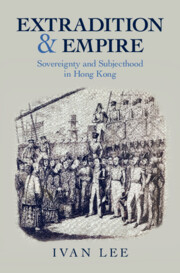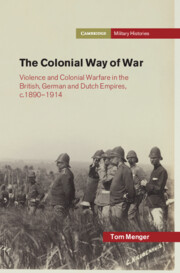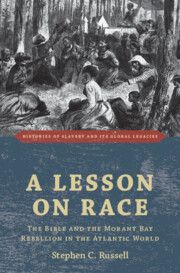Refine search
Actions for selected content:
191 results
Chapter 1 - Comparing the Australian and Canadian experiences
-
- Book:
- After Anzac
- Published online:
- 05 December 2025
- Print publication:
- 17 December 2025, pp 13-37
-
- Chapter
- Export citation
18 - British Fiction, Decolonization, and the Cold War
- from Part IV - Pathways and Legacies: 1945–2020
-
-
- Book:
- The Cambridge Companion to British Literature and Empire
- Published online:
- 20 November 2025
- Print publication:
- 04 December 2025, pp 259-278
-
- Chapter
- Export citation
5 - Anglophone Epics and Ruin Poetry in Eighteenth-Century India
- from Part I - Early Intimations and Literary Genres: 1500–1800
-
-
- Book:
- The Cambridge Companion to British Literature and Empire
- Published online:
- 20 November 2025
- Print publication:
- 04 December 2025, pp 77-92
-
- Chapter
- Export citation
3 - Survival through Reforms: Siam and Its Escape from Colonialism
- from Part II - The Imperial Era
-
-
- Book:
- East Asia and the Modern International Order
- Published online:
- 25 November 2025
- Print publication:
- 20 November 2025, pp 55-75
-
- Chapter
- Export citation
Chapter 8 - Common Law and Cultural Difference in Scott’s Ivanhoe and Chronicles of the Canongate
-
-
- Book:
- British Law and Literature in the Long Eighteenth Century
- Published online:
- 19 September 2025
- Print publication:
- 09 October 2025, pp 167-186
-
- Chapter
- Export citation
Chapter 10 - Liberty in “Parenthesis”
-
-
- Book:
- British Law and Literature in the Long Eighteenth Century
- Published online:
- 19 September 2025
- Print publication:
- 09 October 2025, pp 209-230
-
- Chapter
- Export citation

Extradition and Empire
- Sovereignty and Subjecthood in Hong Kong
-
- Published online:
- 10 September 2025
- Print publication:
- 03 July 2025
Irish Catholic Recruitment into the British Army during the American Revolution: A Case Study of the 46th Regiment of Foot
-
- Journal:
- Transactions of the Royal Historical Society , First View
- Published online by Cambridge University Press:
- 08 September 2025, pp. 1-24
-
- Article
-
- You have access
- Open access
- HTML
- Export citation

The Colonial Way of War
- Violence and Colonial Warfare in the British, German and Dutch Empires, c.1890–1914
-
- Published online:
- 04 September 2025
- Print publication:
- 21 August 2025
6 - Conclusion
-
- Book:
- The Colonial Way of War
- Published online:
- 04 September 2025
- Print publication:
- 21 August 2025, pp 306-314
-
- Chapter
- Export citation
Introduction
-
- Book:
- The Colonial Way of War
- Published online:
- 04 September 2025
- Print publication:
- 21 August 2025, pp 1-37
-
- Chapter
- Export citation
3 - Transimperial Knowledge
-
- Book:
- The Colonial Way of War
- Published online:
- 04 September 2025
- Print publication:
- 21 August 2025, pp 129-187
-
- Chapter
- Export citation
3 - The Colonial State
- from Part I - Non-Sovereign States in the Context of Global Decolonisation
-
- Book:
- Global Decolonisation and Non-Sovereignty
- Published online:
- 16 September 2025
- Print publication:
- 31 July 2025, pp 88-114
-
- Chapter
- Export citation
Introduction
-
- Book:
- Extradition and Empire
- Published online:
- 10 September 2025
- Print publication:
- 03 July 2025, pp 1-19
-
- Chapter
- Export citation

The Invention of Colonialism
- Richard Hakluyt and Medieval Travel Writing
-
- Published online:
- 30 June 2025
- Print publication:
- 24 July 2025
-
- Element
- Export citation
The Politics of Colonial Lists: Conspiracies, Deportations, and Knowledge in 1790s Pondicherry
-
- Journal:
- Comparative Studies in Society and History / Volume 67 / Issue 4 / October 2025
- Published online by Cambridge University Press:
- 24 June 2025, pp. 811-838
-
- Article
-
- You have access
- Open access
- HTML
- Export citation
1 - “These Things Happened”: The Rebellion
-
- Book:
- A Lesson on Race
- Published online:
- 22 May 2025
- Print publication:
- 05 June 2025, pp 12-29
-
- Chapter
- Export citation
Conclusion
-
- Book:
- A Lesson on Race
- Published online:
- 22 May 2025
- Print publication:
- 05 June 2025, pp 123-127
-
- Chapter
- Export citation
Introduction
-
- Book:
- A Lesson on Race
- Published online:
- 22 May 2025
- Print publication:
- 05 June 2025, pp 1-11
-
- Chapter
- Export citation

A Lesson on Race
- The Bible and the Morant Bay Rebellion in the Atlantic World
-
- Published online:
- 22 May 2025
- Print publication:
- 05 June 2025
